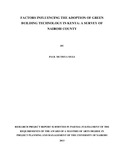| dc.contributor.author | Muli, Paul M | |
| dc.date.accessioned | 2013-07-31T09:50:32Z | |
| dc.date.available | 2013-07-31T09:50:32Z | |
| dc.date.issued | 2013 | |
| dc.identifier.citation | Masters Of Arts Degree In Project Planning And Management, University Of Nairobi, 2013 | en |
| dc.identifier.uri | http://erepository.uonbi.ac.ke:8080/xmlui/handle/123456789/52982 | |
| dc.description.abstract | In the last decade there has been an increasing and exponential growth of building operations in the world and more specifically Africa which according to analysts and research is having a bad toll on the environment; it goes further in contributing to the increase of green gases in the environment which in the end cause global warming and climate change. Sustainable development has become a key and major issue among policy makers and global leaders; this has been sparked with the two natural phenomena that is, climate change and global warming. One of the measures that has been put in place as a predetermination to combat global warming and climate change is the adoption of green building technology. This study sought to establish the factors influencing the adoption of green building technology in Kenya and the survey is based
on Nairobi County. The study was aimed at finding out the factors that influence the adoption of GBT in Kenya: the influence of awareness on the adoption of green building technology, an examination of the impact of resistance to change on the adoption of green building technology, impact of cost on the adoption of green building technology, the influence of standards on the adoption of green building technology and finally an investigation into influence of the local expertise in the adoption of green building technology. The research design adopted by the study is descriptive survey. The questionnaires were distributed to 50 respondents of organizations that have adopted one form or several forms of the GBT schemes. The research project found out that
there was indeed a relationship between the dependent and independent variables since a p-value of 0.01 was obtained thus the alternative hypothesis took precedence over the null. The study concluded that indeed Cost of GBT, Awareness of GBT, Local Experts, GBT Standards and Resistance to Change are factors affecting the adoption of green building technology in Kenya while on the other hand the study recommended that incentives and popularity should be given to green building technology to ensure it is preferred over the old conventional ways of construction. | en |
| dc.language.iso | en | en |
| dc.publisher | University of Nairobi | en |
| dc.title | Factors Influencing The Adoption Of Green Building Technology In Kenya: A Survey Of Nairobi County | en |
| dc.type | Thesis | en |
| local.publisher | College of Humanities and Social Sciences | en |

